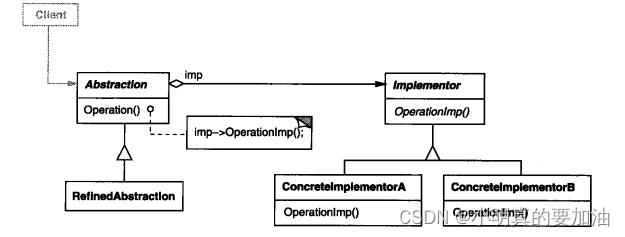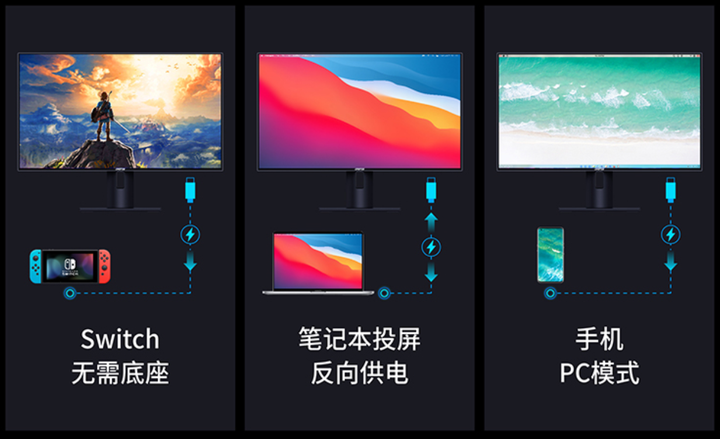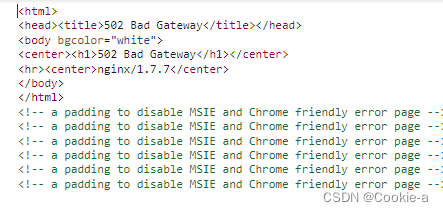本文介绍: 桥接器模式是一种结构型设计模式,旨在将抽象部分与实现部分分离,使它们可以独立变化而不相互影响。桥接器模式通过创建一个桥接接口,连接抽象和实现,从而使两者可以独立演化。
概念
桥接器模式是一种结构型设计模式,旨在将抽象部分与实现部分分离,使它们可以独立变化而不相互影响。桥接器模式通过创建一个桥接接口,连接抽象和实现,从而使两者可以独立演化。
具体内容
桥接器模式通常包括以下几个要素:
- 抽象类(Abstraction): 定义抽象部分的接口,维护一个指向实现部分的引用。
- 扩充抽象类(Refined Abstraction): 对抽象类的扩展,可以引入更多的抽象行为。
- 实现接口(Implementor): 定义实现部分的接口,该接口不一定要与抽象接口完全一致,但必须能够被抽象接口调用。
- 具体实现类(Concrete Implementor): 实现实现接口,提供具体的实现。
类结构图

适用场景
- 分离抽象和实现: 允许抽象部分和实现部分独立变化,降低它们之间的耦合性。
- 可扩展性: 可以方便地添加新的抽象类和实现类,不影响现有的类结构。
- 隐藏细节: 客户端仅与抽象接口交互,不需要关心实现的细节,提高了系统的封装性。
实现
// 实现接口
class Implementor {
operationImpl() {
console.log("Implementor operation");
}
}
// 具体实现类A
class ConcreteImplementorA extends Implementor {
operationImpl() {
console.log("Concrete Implementor A operation");
}
}
// 具体实现类B
class ConcreteImplementorB extends Implementor {
operationImpl() {
console.log("Concrete Implementor B operation");
}
}
// 抽象类
class Abstraction {
constructor(implementor) {
this.implementor = implementor;
}
operation() {
console.log("Abstraction operation ->");
this.implementor.operationImpl();
}
}
// 扩充抽象类
class RefinedAbstraction extends Abstraction {
constructor(implementor) {
super(implementor);
}
operation() {
console.log("Refined Abstraction operation ->");
this.implementor.operationImpl();
}
}
// 客户端代码
const implementorA = new ConcreteImplementorA();
const implementorB = new ConcreteImplementorB();
const abstractionA = new RefinedAbstraction(implementorA);
const abstractionB = new RefinedAbstraction(implementorB);
abstractionA.operation(); // 输出:Refined Abstraction operation -> Concrete Implementor A operation
abstractionB.operation(); // 输出:Refined Abstraction operation -> Concrete Implementor B operation
原文地址:https://blog.csdn.net/weixin_44863521/article/details/135538258
本文来自互联网用户投稿,该文观点仅代表作者本人,不代表本站立场。本站仅提供信息存储空间服务,不拥有所有权,不承担相关法律责任。
如若转载,请注明出处:http://www.7code.cn/show_56058.html
如若内容造成侵权/违法违规/事实不符,请联系代码007邮箱:suwngjj01@126.com进行投诉反馈,一经查实,立即删除!
声明:本站所有文章,如无特殊说明或标注,均为本站原创发布。任何个人或组织,在未征得本站同意时,禁止复制、盗用、采集、发布本站内容到任何网站、书籍等各类媒体平台。如若本站内容侵犯了原著者的合法权益,可联系我们进行处理。






